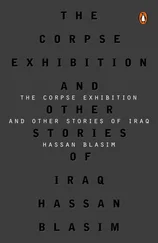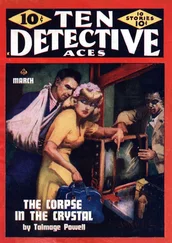I turn to look for the voice and see Father sitting on a chair in the corner, his worry beads in his hand. Again the question: “What are you waiting for?” But now it comes from a different direction. I turn and see Father in another corner. I rush to the closest faucet to open it, but there is no water. The same happens with all the other faucets. I look everywhere, but Father has disappeared from every corner. The corpses keep moving to the opening on the conveyer belt.
The beginning of the summer break after my first year at the academy had been a pivotal point in my confrontations with Father. I’d agreed that I wouldn’t work with him during the school year in order to focus on my studies, but that I would be by his side during my summer breaks. But after my first year of studies, I became convinced that I should channel all my energies on art and not go back to the suffocating atmosphere of the mghaysil —no matter what. I’d heard from one of my colleagues about the possibility of getting work as a house painter. He said it paid well, and I figured it could help me buy my art supplies. I could even contribute a bit to expenses at home.
Father came back from work one evening soon after I had passed my final exams and said: “Come on! Haven’t you had enough rest already? When are you coming to work?”
I told him that this was something I wanted to discuss with him.
He stood at the door of the living room, his worry beads in his hand. “What is going on?”
“One of my friends … his father is a contractor. He paints houses. He has work for me this summer and it pays well.”
Father frowned. He looked down and then stared me right in the eye and said: “Why would you want to do that? You have a good job with me.”
“I thought I’d just give it a try for a few days and see.”
“Do you even know how to paint?”
“It doesn’t take much, Father. He said he’d teach me.”
Father’s disappointment was visible on his face: “So that’s what it comes down to? A painter? I’ve been waiting all these years for someone to help me out on the job and ease my burden.”
“It’s just for the summer. And I’ll help out with expenses here at home.”
He repeated the word “painter” again as if it were a disgrace.
“What’s wrong with it?” I said. “It’s a decent job.”
“And our profession isn’t decent? Not good enough for you, is it? My father, my grandfather, and his grandfather all did it. Now you’re too good for us. Well, thanks ever so much.”
He went into the hall on his way to the stairs. My mother had overheard our conversation and came in from the kitchen to ask what was the matter.
“Your son would rather be a painter than do what I do,” he told her as he climbed the stairs.
She asked: “Is that true, Jawad?”
“Yes, it is.”
“Why, son? Your father needs you to be by his side.”
“What? Is it so shameful to work as a painter?”
I got out of the chair, turned the TV off, and went out for a walk. I wanted to avoid the tense atmosphere which would continue all evening if my father and I stayed in the same room. I hadn’t expected him to be happy with my decision, but I didn’t think he would be totally surprised. He must have known that this day was coming. It’s impossible that he didn’t sense that I had lost all interest in his line of work. Once when I was young I had asked whether he had ever thought of closing the mghaysil or selling it when the war with Iran came to an end and Ammoury would be discharged and able to practice medicine. He said he would never retire and that his work wasn’t some ordinary job but rather a way to gain favor with God. He said that I would inherit the job from him just as he’d inherited it from his father, and his father from his.
My mother told me to donate my first month’s salary to Father, as tradition dictated. I did so, but he pushed my hand away and said, “Give it to your mother.” My mother refused to take it — so I gave her fifty dinars as a gift that day. I used to give her a good amount of my income every month and told her to spend it on herself. Our economic situation wasn’t that good, but Father owned the house, so our monthly expenses were less of a burden than for others.
My mother said that she was going to save the money I was slipping her for my dowry.
I laughed and said: “Who told you I intend to marry?”
“Sooner or later you will, my son.”
When my brother Ammoury came back on leave from the front line, I told him what had happened. He scolded me because I had spoken of my plans with Father without awaiting his return. He would have known how to talk to Father and convince him, he said, or at least soften his reaction to my decision. Ammoury knew well that I could no longer deal with the mghaysil and its corpses. I also told him that the wages I would make from painting were twice what my father would have paid me.
Ammoury told Father that there was no sense my doing something if my heart wasn’t in it. As long as I was doing something decent, he added, why not painting? He reminded Father of his own words: that in washing bodies, volition is crucial. How could I wash if I possessed no desire to do so, he asked. Ammoury made him see reason, but Father never forgave me for straying from the path.
Firas, the friend I painted with, had a great sense of humor. Although the work hours were long, they passed quickly. His father was in charge of the work and coordinated between the owners of the houses and the workers. He provided the supplies, paints, instructions, and other details. Most of the houses we worked on were newly built and unfurnished. Their owners had yet to move in.
A third coworker, Salam, was a bit older than both of us, and seasoned. He was the one who mixed the paints. If it was an old house, before we started painting, we would scrape the walls with sandpaper and fill any cracks. We would start with a coat of primer and then add the second one. I enjoyed the various stages of the process, but especially seeing how beautiful and spotless the walls and ceilings were when we were done.
After my military service, I was appointed as an arts teacher in Ba’quba. The salary was barely enough to cover one week’s transportation to and from work. Why was I so naïve as to nurture the illusion that I could make a living as an artist, especially during the years of the embargo? There were some artists who were selling their paintings to foreigners. The number of foreigners had dwindled, but some journalists, diplomats, and activists still visited Baghdad and frequented the Hiwar gallery, looking for artwork. Artists also sold to Iraqi expats returning for a visit. However, most preferred traditional works or natural landscapes over abstract art. And so I began to feel bored and bitter in the late 1990s, especially as we were painting the houses of the nouveaux riches who had acquired obscene amounts of wealth by exploiting the embargo.
When I started painting houses, I’d thought that I’d only use those thick-bristled brushes temporarily before returning to the fine and feathery ones with which I felt more intimacy. But instead of the blank canvases that I could color any way I wanted and on which I could spread my imaginative visions, I found myself, for years on end, reduced to using no more than two or three colors. Pale colors on cold and monotonous surfaces. Surfaces without details or surprises, except for the odd electric switch panel or the occasional hook for a chandelier. At times a stupid fly would buzz into the sticky surface of paint and struggle there for a few seconds before dying.
Читать дальше












